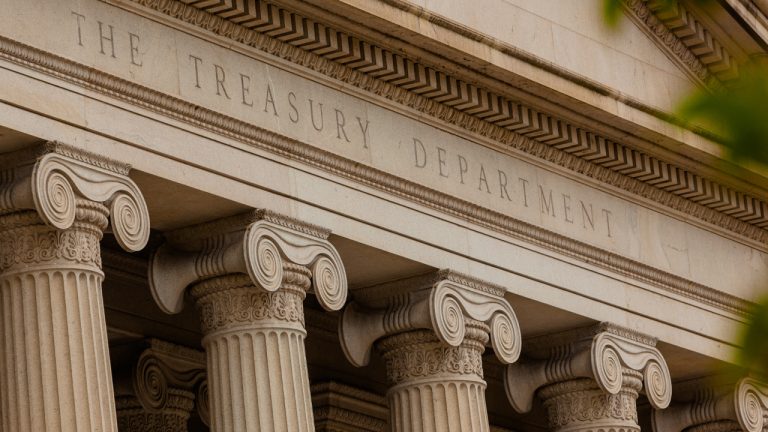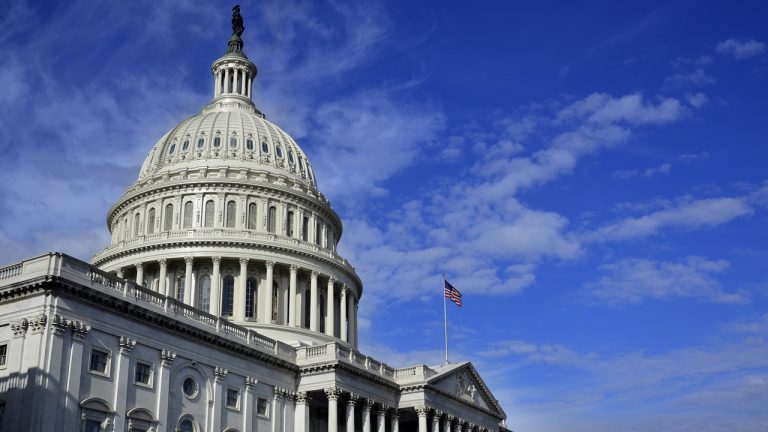 Cryptocurrency and technology proponents have recently been discussing a new bipartisan bill called the “Restricting the Emergence of Security Threats that Risk Information and Communications Technology (RESTRICT)” Act. In addition to targeting firms such as Kaspersky, Huawei, and Tiktok, opponents of the bill believe one of its provisions will punish ordinary Americans for leveraging a […]
Cryptocurrency and technology proponents have recently been discussing a new bipartisan bill called the “Restricting the Emergence of Security Threats that Risk Information and Communications Technology (RESTRICT)” Act. In addition to targeting firms such as Kaspersky, Huawei, and Tiktok, opponents of the bill believe one of its provisions will punish ordinary Americans for leveraging a […]
U.S. Republican Representative Patrick McHenry called for clarification on a “poorly” written digital asset tax provision in a letter to the Treasury.
The incoming United States House Financial Services Committee chair, Patrick McHenry, wants the Treasury to delay implementing a section of the Infrastructure Investment and Jobs Act that deals with digital assets and tax collection.
McHenry sent a letter on Dec. 14 to U.S. Treasury Secretary Janet Yellen with questions and concerns about the scope of Section 80603 of the act. In the letter, he requested clarification over the “poorly drafted” and potentially privacy-compromising section that deals with the taxation of digital assets, scheduled to go into effect next yea.
He said the section requires the government to treat digital assets as the equivalent of cash for tax purposes, which could “jeopardize” the privacy of Americans and hamp innovation.
The section, called "Information Reporting for Brokers and Digital Assets," requires brokers to report certain information relating to dealing with digital assets to the Internal Revenue Service (IRS).
McHenry argues the section has been drafted badly and that the term “brokers” could be “wrongly interpreted” as applying to a wider range of people and companies than intended.
The Act contains a provision requiring individuals or entities engaging in a trade or business to report to the IRS any digital asset transactions that exceed $10,000.
The requirement was challenged earlier this year by Coin Center, a nonprofit advocacy group focused on blockchain technology, which filed a lawsuit against the Treasury arguing that the rule will impose a “mass surveillance” regime on U.S. citizens.
Related: Sens. Warren and Marshall introduce new money-laundering legislation for crypto
According to Fordham International Law Journal, the section is likely to impose reporting requirements on the major cryptocurrency exchanges that already have user information, including customers' names, addresses and social security numbers.
McHenry acknowledged it was a positive step forward to see the Treasury Department state that “ancillary parties” should not be subject to the same reporting requirements as brokers.
In February, U.S. Senator Rob Portman tweeted a letter from U.S. Assistant Secretary for Legislative Affairs Jonathan Davies that clarified that parties such as crypto miners and stakers are not subject to the new legislation.
McHenry's letter concluded by requesting the Treasury “immediately” publish the rules under the section and delay its effective date to give market participants time to comply with any new requirements.
It’s the second letter McHenry has sent to Yellen this year, having sent her a letter on Jan. 26 urging the Treasury secretary to clarify the definition of a broker.

A cryptocurrency-focused advocacy group is challenging the validity of the US sanction against crypto mixing service Tornado Cash. On August 8th, the U.S. Treasury Department’s Office of Foreign Assets Control (OFAC) imposed a ban on Tornado Cash citing that the protocol is used in illicit activities such as money laundering and terrorism. The non-profit group […]
The post Office of Foreign Assets Control Sued by Crypto Think Tank Over Tornado Cash Bans appeared first on The Daily Hodl.
 The non-profit that focuses on policy issues facing cryptocurrencies, Coin Center, has filed a lawsuit against the Treasury department, the secretary of the Treasury Janet Yellen, and the Office of Foreign Assets Control’s (OFAC) director Andrea Gacki. Coin Center’s court filing says that the government’s sanctioning of Tornado Cash exceeds the Treasury’s statutory authority. The […]
The non-profit that focuses on policy issues facing cryptocurrencies, Coin Center, has filed a lawsuit against the Treasury department, the secretary of the Treasury Janet Yellen, and the Office of Foreign Assets Control’s (OFAC) director Andrea Gacki. Coin Center’s court filing says that the government’s sanctioning of Tornado Cash exceeds the Treasury’s statutory authority. The […]
The advocacy group alleged OFAC “exceeded their statutory authority” in sanctioning Tornado Cash because the mixer was a “privacy tool beyond the control of anyone.”
United States-based crypto policy advocacy group Coin Center has followed through with its intention to take the Treasury Department’s Office of Foreign Asset Control, or OFAC, to court over sanctioning cryptocurrency mixer Tornado Cash.
In an Oct. 12 filing in the U.S. District Court for the Northern District of Florida, lawyers for Coin Center as well as crypto investor David Hoffman, an anonymous human-rights advocate known only as John Doe and software developer Patrick O’Sullivan filed a complaint against OFAC, Treasury Secretary Janet Yellen and OFAC director Andrea Gacki. The complaint alleged that sanctioning Tornado Cash was “unprecedented and unlawful,” in part, due to privacy concerns over crypto transactions.
“If a user doesn’t take proactive steps to protect his privacy, the ledger’s transparency allows strangers to track his private associations and stalk his intimate relations,” said the filing. “It invites publicization of and retaliation for his private contributions to unpopular causes. And it allows anyone to see whether he has a lot of assets, which would put a target on his back.”
The plaintiffs added:
“As a result of the Biden Administration’s action, Americans who use Tornado Cash to protect their privacy while using their own assets are criminals. Additionally, their receipt of any asset through Tornado Cash, even one from a stranger that they did not solicit, is a federal crime. And their use of Tornado Cash to protect their expressive activities is criminal as well.”
3/ We intend to win this challenge even if it’s necessary to go to the Supreme Court, and we’ll keep you posted as the case unfolds. You can read more about our suit here. https://t.co/kQNgQNPkEb
— Jerry Brito (@jerrybrito) October 12, 2022
Coin Center alleged Yellen, Gacki and OFAC “exceeded their statutory authority” in adding the crypto mixer to its list of sanctioned entities because Tornado Cash was a “privacy tool beyond the control of anyone.” The plaintiffs claimed OFAC “defied its own rules on the books” in imposing the sanctions in addition to violating the constitutional rights of users whose only intent was achieving some measure of privacy.
“They respectfully request that this Court hold unlawful, set aside, and permanently enjoin the enforcement of the criminalization of Tornado Cash,” said the complaint.
Among Coin Center’s reasons for the court to overrule the sanctions included donors wishing to keep their transactions private, claiming having Tornado Cash sanctioned means they are “less likely to contribute.” O’Sullivan and Hoffman, public figures in the Ethereum ecosystem, used the mixer as one means “to protect himself and his family” from the public tracking his funds as well as to avoid “potential civil and criminal liability” from receiving unsolicited tokens, respectively.
Doe, though living in the United States, has donated in crypto to pro-Ukraine causes amid the country's war with Russia. He claimed being cut off from a privacy tool would make it more likely for Russian agents to “learn about his pro-Ukrainian activities,” potentially putting his livelihood at risk.
Coin Center’s legal team sought for the court to set aside Tornado Cash’s designation as an OFAC Specially Designated National with a “declaration that the criminalization of Tornado Cash is null, void, and with no force or effect.” In addition, they requested compensation for attorneys’ fees and other costs related to the case as well as “any other relief that the Court deems just and proper.”
OFAC added Tornado Cash as well as 44 USD Coin (USDC) and Ether (ETH) addresses connected to the mixer to its list of Specially Designated Nationals on Aug. 8. On Aug. 12, Dutch authorities reported they had arrested Tornado Cash developer Alexey Pertsev, claiming he had facilitated illicit transactions and money laundering through the mixer. TheTreasury also later clarified that publishing the controversial mixer’s code would not be a violation of U.S. sanctions
Related: Tornado Cash is the latest chapter in the war against encryption
Coin Center’s lawsuit followed crypto investors backed by Coinbase suing the Treasury Department in September, claiming OFAC’s sanctioning of Tornado Cash was "not in accordance with law." Coinbase CEO Brian Armstrong argued theTreasury’s actions exceeded its authority, “harm innocent people, remove privacy and security options for crypto users, and stifle innovation.”
 On September 8, the crypto security and smart contract auditing firm Certik revealed that 500,000 DAI was sent through the Tornado Cash mixing platform after the funds were stolen in August 2021. The digital assets originally stemmed from the DAO Maker breach that saw the loss of more than $7 million in ERC20 tokens and […]
On September 8, the crypto security and smart contract auditing firm Certik revealed that 500,000 DAI was sent through the Tornado Cash mixing platform after the funds were stolen in August 2021. The digital assets originally stemmed from the DAO Maker breach that saw the loss of more than $7 million in ERC20 tokens and […] On August 15, the non-profit that focuses on policy issues facing crypto assets, Coin Center, published a blog post that says the organization is looking at the legality of the recent Tornado Cash sanctions enforced by the U.S. Treasury Department’s Office of Foreign Asset Control (OFAC). The post, published by Coin Center’s Jerry Brito and […]
On August 15, the non-profit that focuses on policy issues facing crypto assets, Coin Center, published a blog post that says the organization is looking at the legality of the recent Tornado Cash sanctions enforced by the U.S. Treasury Department’s Office of Foreign Asset Control (OFAC). The post, published by Coin Center’s Jerry Brito and […]